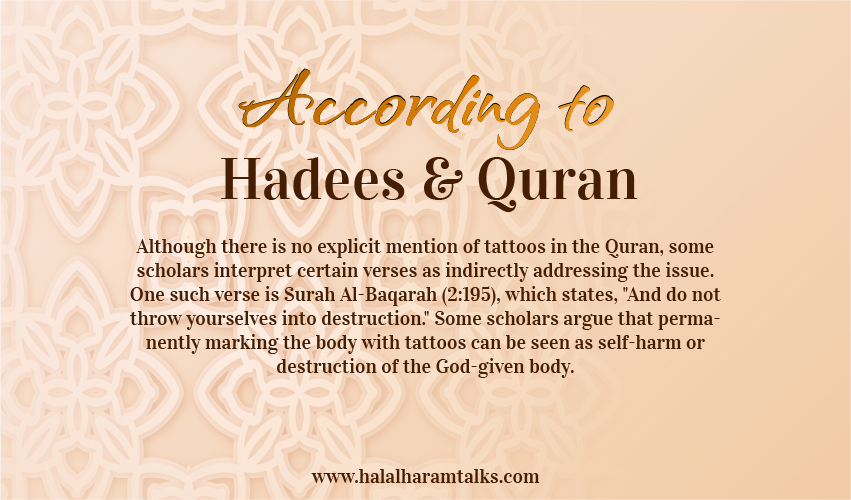In today’s modern world, tattoos have become increasingly popular as a form of self-expression and body art. However, within the Islamic community, questions often arise regarding the Is Tattoo Haram in Islam. This article aims to delve into the topic of whether tattoos are considered halal or haram, exploring the different perspectives, scholarly opinions, Quranic verses, and hadiths that shed light on this matter.
To comprehensively explore the topic, this article will delve into the nuances of the debate on whether tattoos are halal or haram in Islam. By examining Quranic verses, relevant hadiths, and scholarly opinions, we aim to provide a comprehensive understanding of the religious stance on tattoos and enable individuals to make informed decisions based on their personal beliefs and convictions.
Is Tattoo Haram
Tattoos and body modification have become increasingly popular in recent times, raising questions about their religious permissibility, particularly in Islam. This article aims to address the question, “Is tattoo haram?” by examining various viewpoints, the Quranic verses, hadiths, and scholarly opinions on the matter.
Tattoos are a form of permanent body art where ink is injected into the skin to create designs or symbols. Some people consider them a means of self-expression, while others view them as a form of adornment or cultural significance. However, when it comes to determining the permissibility of tattoos in Islam, there are conflicting opinions among scholars.
For more: Is Ear Piercing Haram
Why Tattoo Is Halal Or Haram
The question of whether tattooing is halal (permissible) or haram (forbidden) has generated diverse opinions within the Islamic community. Those who argue that tattoos are prohibited base their claim on several fundamental considerations. First and foremost, they argue that tattooing involves permanently altering the body, which is seen as a violation of the natural state of creation. Additionally, some scholars believe that tattoos can be associated with paganism, as they were historically practised by certain pagan cultures.
On the other hand, those who contend that tattoos are permissible argue that there is no clear-cut prohibition mentioned in the Qur’an or authentic hadiths specifically addressing tattoos. They assert that as long as the tattoo does not contain any offensive, obscene, or blasphemous content, it should not be considered haram. They also highlight that Islam encourages individual expression as long as it does not contradict the core principles of the faith.
For more: Is Nose Piercing Haram
Quranic Verses & Hadith Is Tattoo Haram
Although there is no explicit mention of tattoos in the Quran, some scholars interpret certain verses as indirectly addressing the issue. One such verse is Surah Al-Baqarah (2:195), which states, “And do not throw yourselves into destruction.” Some scholars argue that permanently marking the body with tattoos can be seen as self-harm or destruction of the God-given body.
In addition to the Quranic verses, several hadiths shed light on the topic. One narration from Sahih Bukhari and Sahih Muslim reports that the Prophet Muhammad (peace be upon him) cursed those who get tattoos and those who perform tattoos. However, it is worth noting that there is a difference of opinion among scholars regarding the authenticity and interpretation of this hadith.

Is Temporary Tattoo Haram?
Temporary tattoos, such as those made with henna or sticker-like substances, are a popular alternative to permanent tattoos. These temporary forms of body art have gained widespread acceptance and are often used during festive occasions or celebrations. Many scholars argue that temporary tattoos, especially those made with natural substances like henna, are permissible (halal). Given their temporary nature and lack of harm to the body.
For more: Is Vaping Haram In Islam
Is Semi-Permanent Makeup Haram?
Semi-permanent makeup, also known as cosmetic tattooing, involves the application of pigments to enhance features such as eyebrows, lips, and eyeliner. While the permissibility of this practice may vary among scholars, the general consensus leans towards classifying semi-permanent makeup as a permissible form of adornment. As long as the pigments used are not harmful and do not necessitate any permanent alteration of the body, it is generally considered halal.
For more: Is Ludo Haram
Is Lip Tattoo Haram?
Lip tattoo is a cosmetic procedure aimed at enhancing the lips’ color and shape. Although there may be different perspectives on this matter, most scholars deem lip tattooing as impermissible. The main argument against lip tattoos is that they involve permanently altering the body, which goes against the natural state of creation.
For more: Is Makeup Haram
Is Fake Tattoo Haram?
Fake tattoos, commonly referred to as temporary tattoos, are temporary body art forms that are easily adhered to the skin and can be removed. Since fake tattoos are not permanent and do not involve any invasive procedures, they are generally considered permissible in Islam. As long as the content of the tattoo does not violate Islamic principles, fake tattoos can be seen as a harmless means of temporary self-expression.
For more: Is Drawing Haram In Islam
Is Henna Tattoo Haram?
Henna tattooing is a popular practice, especially in various Muslim cultures, where the henna paste is applied to the skin in decorative patterns. Henna, derived from a plant, is a natural dye used for coloring and conditioning. The majority of scholars agree that henna tattoos are permissible, as they are temporary and cause no permanent alteration to the body.
For more: Is It Haram To Have Crush
Is Eyebrow Tattoo Haram?
Eyebrow tattooing is a method that involves implanting pigment into the skin to enhance the shape and appearance of eyebrows. The permissibility of eyebrow tattoos varies among scholars. Some view it as impermissible due to the permanent alteration of the body. While others argue that it is acceptable as long as it appears natural and avoids resembling prohibited practices. Like tattooing with images or religious symbols.
For more: Is It Haram To Cut Nails At Night
Is Microblading Tattoo Haram?
Microblading is a technique used for enhancing the appearance of eyebrows by manually implanting pigment into the skin. Similar to eyebrow tattooing, the permissibility of microblading is subjected to differing opinions among scholars. Some argue that it is impermissible due to the permanent alteration of the body. While others contend that it is permissible if it is done to correct a deformity or enhance natural features. Ultimately, individuals seeking microblading should consult with knowledgeable scholars to make an informed decision based on their specific circumstances.
For more: Is It Haram To Dye Your Hair Black
FAQs
A: The permissibility of tattoos in Islam is a subject of differing opinions among scholars. While some argue that all tattoos are haram. Others believe that if they do not contain offensive or blasphemous content, they may be permissible.
A: The classification of tattooing as a major sin is not universally agreed upon. While some scholars consider it a major sin, others view it as a minor sin or a discouraged act. It is important to note that minor sins can be forgiven through repentance.
A: Tattoos do not invalidate a person’s ability to perform religious rituals in Islam. However, it is important to maintain proper ablution (wudu) for prayer by ensuring that water reaches the skin. And that the tattoo does not obstruct the washing process.
A: Yes, tattoo removal techniques, such as laser treatments, exist for those who wish to remove their tattoos. Additionally, it is permissible to cover up tattoos with clothing or other means if a person regrets having them.
Conclusion
The question of whether tattoos are halal or haram in Islam yields varying opinions among scholars. While some argue that tattoos are prohibited due to the permanent alteration of the body. And potential associations with non-Muslim practices. Others contend that they may be permissible as long as they do not contain offensive or blasphemous content. It is important for individuals to seek guidance from scholars knowledgeable in Islamic jurisprudence. And make personal decisions based on their understanding of the evidence presented.
Ultimately, the objective of Muslims should be to preserve the integrity of their bodies, and prioritize adherence to Islamic principles. And avoid practices that may lead to self-harm or imitate non-Muslim traditions. To explore further discussions on what is halal and haram. It is recommended to visit our website where you can find comprehensive resources and guidance related to Islamic teachings.
